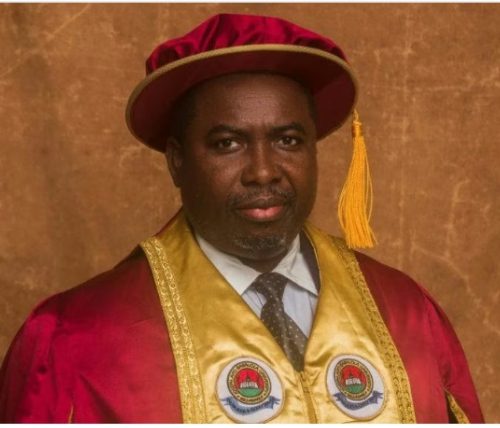679
By Oscar Okhifo
Following the recent recommendation of Professor Joash Amupitan, SAN, by the Council of State to replace Professor Mahmood Yakubu, subject to Senate confirmation as Chairman of the Independent National Electoral Commission (INEC), reactions have continued to pour in from across the country.
Nigerians from different walks of life have expressed mixed feelings, from cautious optimism to outright skepticism as the electoral body prepares for a change in leadership.
In a vox pop conducted by Oscar Okhifo of Pointblank News, citizens, shared their expectations, reservations, and advice for the incoming electoral umpire.
A Professor of Political Science, Jideofor Adibe, offered a historical reflection and a note of caution.
“So far, nobody has held that position and left with his credibility intact. Even the celebrated Prof. Atahiru Jega was lucky that President Goodluck Jonathan ruled out litigation. If Jonathan had gone to court, Jega’s reputation would have been dented. I really don’t know why there’s this obsession with Professors occupying that position. By now, we should have looked elsewhere.
“It’s a complete different world from what we do in the universities. You bring a man from a lean salary structure to head an institution that controls billions of naira? That could be a serious challenge. I’m sure he will make a good difference.”
Nwobodo Emeka, a civil servant in Enugu expressed cautious hope:
“I pray he doesn’t betray Nigerians again. I’ll advise him to be a revolutionary chairman. He should work for Nigerians, not for politicians.”
Rev. Dominic, a Lagos based cleric, urged patience and prayer:
“The taste of the pudding is in the eating. His CV is impressive, but I’ll wait to see how he conducts his first election. May God grant him wisdom.”
“My brother, I will pray for him. That position is not easy. He will be heavily challenged by several powers. May God be with him.” Said Ifeoluwa Dare, a trader at Gudu.
Abuja-based legal practitioner, Kamin Asunugie, was emphatic about the need for a complete departure from the past.
“I want the chairman-designate to do everything differently from his predecessor. He should steer the ship away from the path of Prof. Mahmood Yakubu. I sincerely want to see him outperform Prof. Atahiru Jega. Mahmood’s era was a setback, even worst than the days of Prof. Maurice Iwu.”
For Prince Vincent Okhifo, a Benin City-based businessman and good governance advocate, embracing technology is key to restoring credibility:
“The first thing I and most Nigerians expect, is full implementation of electronic voting. That will drastically reduce the fraud we’ve seen over the years. He should know his reputation is at stake. Let him prove wrong those who say he’ll dance to the tune of politicians. He should be the change we yearn for.”
Nicholas Evanono, a sociologist and public affairs commentator, lives in Yenagoa . He stressed on the importance of conscience in leadership.
“Of a truth, I expect him to let his conscience be his compass. If he follows the path of morality, he’ll perform his duties effectively.”
From Niger State, a school teacher, Ismaila Ahmad called for faith and accountability:
“The legal luminary has seen Nigerians’ reactions. He is loved already. He should be loyal to the people and fear Almighty Allah. The same Nigerians that are clapping now will stone him if he fails. Allah will guide him through.”
Not everyone was optimistic. Some respondents feel that Nigeria can’t be repaired again. They expressed doubt that real change was possible.
Felix, an Abuja-based trader, was blunt in his disillusionment:
“My brother, it’s Tinubu that will tell that man what to do. I’ve lost faith in this country. I’ll never vote again until there’s real reform in the system.”
Meanwhile, major opposition parties have called on the incoming INEC Chairman to serve Nigerians with integrity, remain transparent, and rebuild public confidence in the electoral process. Other stakeholders advised him to avoid any action that could further erode the trust of citizens in the nation’s democracy.
As Professor Amupitan prepares to assume office, the mood among Nigerians remains divided, a blend of hope for genuine reform and fear of another disappointment. Whether he can restore faith in the electoral system or become another name in the long list of unmet expectations will depend on how he handles the critical task of rebuilding trust in Nigeria’s democracy.
It is obvious that the faith of many citizens in the system and its umpires has greatly waned over time. One only hopes that the new man, upon assumption of office, will by his actions and inactions prove to Nigerians that there can still be an “American in Babylon”, a symbol of integrity in a space many have lost faith in.



